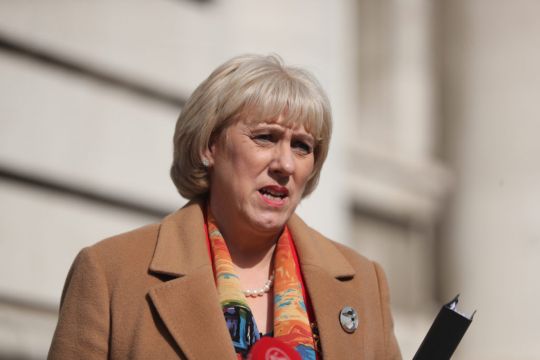The hackers who breached the HSE’s IT system have “no regard for human life”, the acting Justice Minister has said.
The criminals involved have caused “untold chaos” in the health system, Heather Humphreys added.
A ransomware attack resulted in the HSE having to close down all its IT services one week ago, causing widespread delays and the cancellation of appointments at hospitals across the country.
A decryption key was made available on Thursday evening by the hackers and the Government is looking into its validity.
Due to the ransomware attack on our IT systems, there continues to be disruptions to our services. More details on service disruptions here: https://t.co/AaXcK1cwr0 pic.twitter.com/sZ7dfmoMoc
Advertisement— HSE Ireland (@HSELive) May 20, 2021
Ms Humphreys said the National Cyber Security Centre (NCSC) and Gardaí in tandem with US and European partners were “investigating all avenues”.
“I cannot say who it is. We don’t know,” she said. “But what we do know is that they are criminals. They have no regard for human life.
“They don’t care that they have caused untold chaos in our health service. And you have to consider this is following on from a very difficult year that we’ve all had in terms of Covid.”
Speaking at the launch of the Tidy Towns Competition in Co Monaghan, the Cavan-Monaghan TD said the Government had not paid any ransom to secure the decryption key.
Great to announce the return of the SuperValu Tidy Towns competition, which is so important to communities across the country. @TidyTownsIre @SuperValuIRL @DeptRCD https://t.co/qX5GGQiTIQ
— Heather Humphreys (@HHumphreysFG) May 21, 2021
She added it was being examined “very carefully” by the HSE and NCSC, and appealed to anyone who is contacted by scammers not to interact with them.
“I would say to anyone who gets a call from criminals looking for money or looking for their details or the PPS number, don’t give it to them. Report it to the gardai. Or go on to the Garda confidential line,” she said.
The decryption key was made available almost a week after the IT system was targeted, and Health Minister Stephen Donnelly said work was being carried out to ensure its validity.
“The initial results are positive but obviously it’s a detailed technical piece of work and we need to be absolutely sure this will help restore the health systems rather than potentially cause further harm,” he told RTE’s Morning Ireland programme.
He added that “good progress” was being made in separate attempts to restore IT systems across the country.
Mr Donnelly said that as of Thursday evening some of the most important IT systems were back up and running at a local level in some hospitals. These include imaging software for radiology and some patient administration systems.
But he said radiation oncology remained a problem and the restoration of these services is an “absolute priority” for the HSE.
Mr Donnelly told the programme it was “unclear” why the decryption key was being made available and it “came as a surprise” to the Government.
He added there could be “any number of reasons”, and it would not be useful for him to speculate.
The Wicklow TD also reiterated that the Government did not pay any ransom to the hackers involved in the attack.
We will make every effort to protect patients and their data as much as possible.
The disgraceful cyber attack this week is an attack on the Irish state and all of us who value our health system so highly. https://t.co/cxMCJyPj0j— Stephen Donnelly (@DonnellyStephen) May 20, 2021
“Categorically, no ransom has been paid by this Government directly, indirectly, through any third party or in any other way. Nor will any such ransom be paid,” he said.
Mr Donnelly also told the programme the Government was taking the hackers’ threat to upload data online “very seriously”.
They reportedly threatened to release patient data on Monday if a ransom was not paid.
He appealed for anyone who is contacted about their information to bring it to the attention of gardai.
On Thursday HSE chief executive Paul Reid described the “catastrophic” impact of the “stomach-churning” hack of its IT systems.

He said the “callous act” was an attack on health workers who have been working “relentlessly” throughout the coronavirus pandemic.
The number of appointments in some areas of the system has dropped by 80% as health workers grapple with paper records while work continues to recover IT systems.
The NCSC and the Garda National Cyber Crime Bureau are carrying out an international investigation into the attack.







